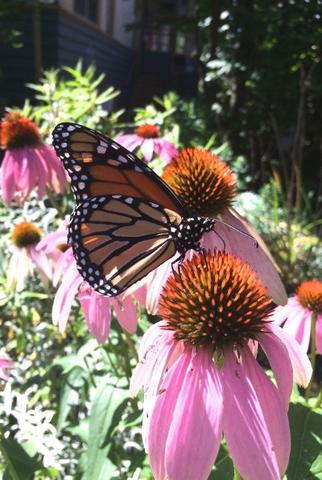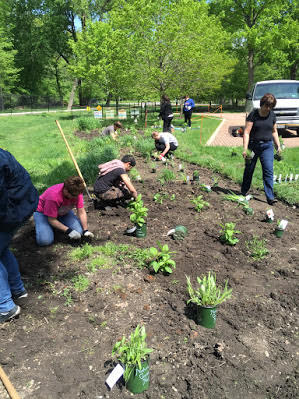This program provides modest grants to nonprofits who want to improve the environment and engage their community by creating, expanding, or renewing populations of native plants in their community. It is open to nonprofits in or near our service territory of west central Cook County (IL)*.
Applications for 2026 are now OPEN.
Grant funds are for the purchase of native plants. This is a small grant program and award amounts depend on the project. Typical awards are $100-$2,000 per applicant.

Who Can Apply:
- Scout troops
- Libraries
- Schools and School PTOs
- Community/Neighborhood Organizations
- Artistic or Youth Service Organizations
- Religious Institutions (church, temple, mosque, etc.)
Your group must be a nonprofit, e.g.: (501(c)(3)), or affiliated with a nonprofit who will act as your group’s fiscal agent.
What We Will Fund:
Projects that benefit native wildlife and enrich the community. Grant money is to purchase native flowers, grasses, trees, shrubs and/or seeds for the following goals:
- Creating, expanding, or renewing a native plant community
- Providing habitat for native wildlife such as insects and birds
- Reducing the amount of nonnative turf grass or other non-native landscaping
- Supporting equitable access to nature through native plantings
To see who and what we’ve funded in the past, see this post of past awardees.
Complete our online application for consideration.
TIP: Download this text version to work on then cut and paste your answers into the online application.
We will announce results around April 22, 2026
Requirements of Proposed Projects:
- Preference is given to west central Cook County, IL*
- Only plants or seed native to the Midwest will be funded.
- Cultivars of any kind are not permitted.
- Applicant will do the planting and maintenance of the project.
- There must be a plan for ongoing maintenance.
- Applicant must have permission from the land owner (e.g. if a school, the district is aware and has given permission).
*We have and will fund projects in greater Cook County and eastern DuPage County.
Key Definitions
Native plants are those that have grown in North America since the last ice age (~10,000 years ago). Native plants grow in communities of other plants adapted to similar soil, moisture, and weather conditions. Midwestern plant communities include oak-hickory and beech-maple forests, prairie, and wetlands.

We will only fund proposals comprised of native plants of the Midwest. We recommend sourcing local ecotypes when possible.
Non-native plants are plants brought to a place deliberately or accidentally by people. Non-native plants arrived in the Midwest within the last 500 years. Without human action these plants would never be found growing in a region. Examples include burning bush (Asia), Norway maple (Europe), Kentucky bluegrass (Europe), tulips (Europe), daylilies (Asia), daisies (Europe), and many many more.
A cultivar is any plant selectively bred by humans to enhance a particular characteristic of the plant, i.e. leaf color, bloom color, hardiness. You can identify a cultivar by the name on the label: Poa pratensis ‘shamrock’ = Kentucky Bluegrass ‘shamrock’ cultivar.
A nativar is a cultivar of a native species. The label will help you identify, e.g. Echinacea purpurea ‘Avalanche’ = Purple coneflower ‘Avalanche.’ This cultivated native has white flowers with green centers.
We will not fund cultivars or nativars. Learn more here: Native, or Not So Much?
Additional Information
Mulch: Grant funds cannot be used to purchase mulch. We do recommend that you mulch around newly planted plants. Mulching reduces water loss, suppresses weeds, and helps build healthy soil. Many towns offer free mulch. Oak Park maintains a pile in the parking lot of Rehm Pool. Leaves also work. If you do buy mulch, stick with shreded hardwood. Avoid cypress or dyed mulches.
Where Do I Buy Plants? West Cook Wild Ones conducts a spring and fall plant sale. Grantees receive a discount. Additional landscapers and nurseries are listed here.
Money: Projects are funded on a reimbursement basis. Once receipts or purchase orders are presented (physical or electronic) we will issue a check to the person listed in the grant application.
• All receipts must be submitted no later than December 1. Sooner is prefered.
• Send reciepts/purchase orders to [email protected] with subject line: Garden for Nature Grant Reciept.
How Many Plants Do I Need? 1 plant/sq. ft. is typical. Use this handy calculator to try different densities and planting patterns. The denser the planting the better. The denser the planting the less room there is for weeds. Better to plant a smaller area with higher density than a larger area with fewer native plants. We strongly recommend you plant 60% grasses/sedges and 40% flowers.
Any Questions? Please email us at [email protected] with subject line: Garden for Nature Grant Program.
Click to apply: 2026 Applications Now Being Accepted. April 5, 6 pm Deadline.
Grant awards will be announced around April 22.
